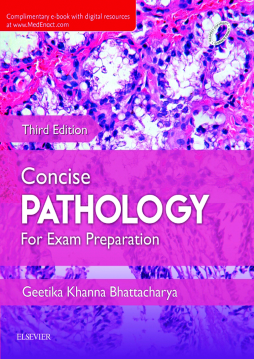
Additional Information
Book Details
Abstract
This book has been written in a concise and easily assimilable style to enable rapid understanding of the mechanism and morphology of disease. It has been structured in a question-answer format that incorporates information in numerous flowcharts and tables that are easy to tnagars001recall and duplicate in the examination. The new edition is based on Robbins and Cotran Pathologic Basis of Disease, 8E.
Salient Features
?? Covers all must know topics in a very simple language and lucid style
?? Helps in rapid revision and self-assessment before examination
?? Enlists contrasting features of clinically and morphologically similar conditions in a tabular format for further clarification of concepts
?? Extensively revised, updated, and strengthened to keep up with the latest changes in the standard reference textbooks of pathology
?? Chapter on haematology has been thoroughly reorganized and the most contemporary concepts have been inserted in the chapters on immunity, genetics and neoplasia as well as systemic pathology
?? Provides an integrated approach to the study of pathology
?? Emphasizes understanding of evolution of disease and the use of laboratory tests to interpret the stage of evolution
?? Provides clinical correlation in all major subject areas to enable understanding of clinical situations and development of clinical decision making ability
Table of Contents
| Section Title | Page | Action | Price |
|---|---|---|---|
| Front Cover | Cover | ||
| Concise Pathology FOR EXAM PREPARATION THIRD EDITION | iii | ||
| Copyright Page | iv | ||
| Dedication | v | ||
| Preface to the Third Edition | vii | ||
| Preface to the First Edition | ix | ||
| Acknowledgements | xi | ||
| Table of Contents | xiii | ||
| I General Pathology | 1 | ||
| 1 Cell Injury and Cell Death | 2 | ||
| Q. Define pathology. | 2 | ||
| Q. What are the four aspects of a disease that form the core of pathology? | 2 | ||
| Q. What are the two main branches of pathology? | 2 | ||
| Q. Define homeostasis. | 2 | ||
| Q. Define cellular adaptation. | 2 | ||
| Q. Define cell injury. | 3 | ||
| Q. Enumerate the various cellular responses to injury. | 3 | ||
| Q. What are the different types of cell injuries? | 3 | ||
| Q. Enumerate and describe in brief different types of cellular adaptations. | 4 | ||
| Hyperplasia | 5 | ||
| II Diseases of Organ Systems | 227 | ||
| 10 Blood Vessels | 228 | ||
| Arteries | 228 | ||
| Veins | 228 | ||
| Capillaries | 228 | ||
| Arterioles | 228 | ||
| DISEASES OF THE BLOOD VESSELS | 229 | ||
| Q. Define vasculitis. | 229 | ||
| Q. Classify vasculitis. | 229 | ||
| Q. Describe the aetiopathogenesis of vasculitis. | 230 | ||
| Q. Write briefly about Takayasu arteritis. | 231 | ||
| Salient Features: | 231 | ||
| Pathogenesis | 231 | ||
| Clinical Features | 231 | ||
| Gross Pathology | 231 | ||
| Microscopy | 231 | ||
| Q. Write briefly about temporal (giant cell) arteritis. | 231 | ||
| Salient Features | 231 |
